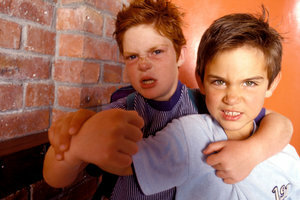Violence in elementary school
When a child exhibits social abnormalities, it often has a deeper background. This can be of a very simple nature, but it can be due to a traumatizing event. It is important to find out the origin and to work actively with the child on the behavior: Do not be silent about it - only speaking people can be helped.

Violence - how is it expressed?
- Violence doesn't just come in the form you've probably heard of: boys beat each other. Violence can also be expressed in verbal form, i.e. in the form of words; it can take place among girls, towards animals, towards objects or even oneself.
- Violence is a versatile expression and a form of compensation and becomes an expression of other feelings, such as pain, fear, sadness or indeed anger.
- If it is the case that your child is currently showing suspicious behavior in the form of violence, ask At the beginning, ask yourself the following question: Has something changed in the child's environment lately? changes? Environment, this can mean several fields: the circle of friends, the family environment, a living situation or perhaps a new faculty. Ask yourself: When was my child's behavior first noticed? The timing can also be instructive.
What to do if your child has behavior problems
- Do not feel so helpless, there are a number of points of contact that can help you in the situation - feel free to take advantage of this help. Don't worry about being badly perceived as a parent because it isn't - after all, get help and advice.
- At the beginning you should seek a conversation with the class teacher and, if necessary, other teachers who have noticed your child's behavior. Clarify questions such as: How long has your child been suspicious? How is this anomaly expressed? To whom or to what did it become noticeable? What can you do as a parent?
- Talk to your child openly about the behavior. Violence is socially incompatible and creates resistance. Ask why your child is doing this. To whom this behavior applies. How is your child doing otherwise? Are there situations in which your child is overwhelmed - or even under-challenged -?
- Spend time with your child. The connection to you as a parent can be a helpful support if you are overwhelmed and you can also build a bridge to find out the reason for the corresponding behavior. Building and strengthening an emotional bond with your child should be an integral part of this discussion.
- There may be a social worker at your child's school who will have an advisory role and will be at your side with individual options for action. The social worker often has different leeway than the teacher and finds a different approach to your child than a therapist. In addition, he can possibly act in context.
- If in doubt, it is possible to involve a child and youth therapist. The first consultation hour is free of charge. Ask your child's school, they will certainly be able to recommend a professionally competent therapist.
Defiant phase at the age of 8 - what to do?
Defiant phases in small children and during puberty strain the nerves of many ...
How helpful do you find this article?
